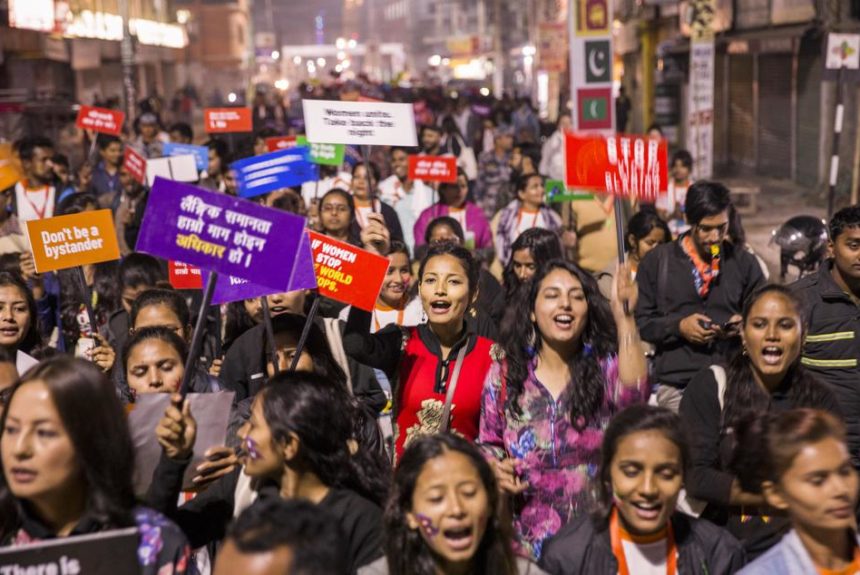Part of Kathy Caprino’s series “Building a World That Works For All” Since 1987, International Day of Action for Women’s Health has been observed on May 28. And while some progress has been made since 1987, the state of global women’s health is facing deeper challenges than ever. For example, today, 45% of girls and women worldwide aged 15-49 who are married or in unions cannot make their own decisions about sexual and reproductive health and rights by deciding about healthcare, contraception, and their own sexual practices (i.e. saying no to sex).
To confront the lack of women’s rights to personal reproductive autonomy and collective gender equality, the Generation Equality Forum convened by UN Women – a United Nations entity dedicated to gender equality and the empowerment of women — will launch a series of concrete, ambitious and transformative actions to achieve immediate and irreversible progress towards gender equality. Co-hosted by the governments of France and Mexico, the
The Forum is fueled by Action Coalitions which aim to deliver measurable change for women and girls around the world in the coming five years. In addition to the Action Coalition on bodily autonomy and sexual and reproductive health and rights, other Action Coalitions have been established on five cross-cutting themes that are prerequisites to achieving gender equality:
- Economic justice and rights
- Gender-based violence
- Feminist action for climate justice
- Feminist movements and leadership
- Technology and innovation for gender equality
Forum kicked off in Mexico City at the end of March and culminates in Paris from June 30 through July 2, 2021.
To learn more about the visions, goals and plans of the Generation Equality Forum, I caught up this week with Åsa Regnér, the Assistant Secretary-General and Deputy Executive Director for Normative Support, UN System Coordination and Programme Results at UN Women. Until 2018, Regnér served as Minister for Children, the Elderly and Gender Equality of Sweden. She has extensive experience in the area of gender equality and women’s empowerment, having held various leadership positions in government, non-governmental organizations and the United Nations.
This year, the International Day of Action for Women’s Health highlights the disproportionate impact of the COVID-19 pandemic on women’s right to sexual and reproductive health.
Here’s what Regnér shares:
Kathy Caprino: How has the Covid-19 pandemic made the achievement of gender equality and women’s bodily autonomy and health rights more urgent?
Åsa Regnér: In April 2020, the UN Secretary General’s Policy Brief The Impact of COVID-19 on Women found that, while men reportedly have a higher fatality rate, women and girls have been especially hurt by the resulting economic and social fallout of the Covid-19 pandemic. Impacts have been particularly felt in the areas of violence against women and girls, women’s employment and women-owned enterprises, the leadership and participation of women and girls, gender-sensitive and data-driven national responses, and in humanitarian and post-conflict settings.
The Covid-19 pandemic has put almost universal pressure on the gains in gender equality made since the adoption of the Beijing Platform for Action and has exacerbated existing inequalities across all aspects of life for women, girls and communities.
Overstretched health services due to Covid-19 are diverting resources away from services women need, including pre- and post-natal health care and contraceptives. Women also face barriers in seeking out services. Evidence from UN Women and UNFPA’s recent study, Impact of COVID-19 on Gender Equality and Women’s Empowerment in East and Southern Africa, shows that the pandemic has had far-reaching and diverse effects on women and girls in East and Southern Africa, and will set back global efforts to achieve most gender-related Sustainable Development Goals targets.
Here are several ways the pandemic negatively affected key areas of progress in women’s health:
- Child healthcare services, maternal care for pregnant women, services relating to chronic illnesses, and sexual and reproductive health care, including family planning and HIV prevention services, were negatively affected by the pandemic. In Kenya, nearly 60% of women and more than 50% of men could not access health-care services for their children.
- In South Africa and Mozambique, less than 20% of women accessed family planning and other reproductive health services during the pandemic.
- School closures have also led to less access to information about sexual and reproductive health, impacting on increased teenage pregnancies, unwanted pregnancies, and exposure of girls to increased sexual violence.
UN Women’s report From insights to action: Gender equality in the wake of COVID-19 further highlighted findings from UN Women’s rapid gender assessment surveys in 2020:
- In 4 out of 10 countries in Europe and Central Asia, at least half of women in need of family planning services have experienced major difficulty accessing them since the pandemic began. For example, in Azerbaijan and Turkey, 60% of women have had trouble accessing gynecological and obstetric care due to Covid-19.
- In Asia and the Pacific, 60% of women report facing more barriers to seeing a doctor due to the pandemic.
With no or only limited access to contraceptives, women have been experiencing an increasing number of unintended pregnancies since the outbreak of the pandemic. In 2020, a study by UNFPA projected that significant levels of lockdown-related disruption over 6 months could leave 47 million women in low- and middle-income countries unable to use modern contraceptives, leading to a projected 7 million additional unintended pregnancies.
Caprino: What are some of the unseen consequences to violations of women’s and girls’ reproductive rights that many of us are not aware of?
Regnér: Bodily autonomy, decision-making and integrity around one’s body and physical and mental health is central to achieving gender equality. The ability of women to control what happens to their own bodies impacts their ability to engage in economic, social and public life and the terms on which they do so.
As such, we risk seeing an overall decline in for example women’s economic empowerment and political participation. Bodily autonomy is therefore a pre-condition for women’s ability to participate in the labor market and live economically independent lives.
Caprino: How does the Generation Equality Forum plan to accelerate gender equality and specifically towards achieving bodily autonomy and sexual and reproductive health rights for women and girls?
Regnér: The Generation Equality Forum is a multi-stakeholder global gathering, bringing together a wide variety of actors to take stock of the gains we have made since the historic Beijing Declaration and Platform for Action, and take ambitious steps towards the full implementation of this critical framework within the UN Decade of Action.
An Action Coalition on Sexual Reproductive Health and Rights and Bodily Autonomy has been established, which includes stakeholders from governments, international organizations, the private sector, civil society and youth actors. The Action Coalition presented its work at the Generation Equality Forum in Mexico City between March 29 to 31, 2021. At the Generation Equality Forum in Paris, between June 30 to July 2, 2021, the Acton Coalition will launch a five-year, multi-stakeholder-led plan for acceleration of progress.
Just some of the key areas of focus are:
1) Increase delivery of comprehensive sexuality education in and out of school reaching 50 million more children, adolescents, and youth in all their diversity by 2026.
2) Within a comprehensive framework that includes SRHR services as an essential component of Universal Health Care, increase the quality of and access to contraceptive services for 50 million more adolescent girls and women in all their diversity; support removal of restrictive policies and legal barriers, ensuring 50 million more adolescent girls and women in all their diversity live in jurisdictions where they can access safe and legal abortion by 2026.
3) Through changing gender norms and increasing knowledge of rights, empower 260 million more girls, adolescents and women in all of their diversity to make autonomous decisions about their bodies, sexuality and reproduction by 2026
4) Enact legal and policy change to protect and promote bodily autonomy and SRHR in at least 20 countries by 2026.
5) Increase accountability to, participation of and support for autonomous feminist and women’s organizations (including girl- and adolescent-led, and Indigenous organizations and collectives), women human rights defenders and peacebuilders. Strengthen organizations, networks and movements working to promote and protect bodily autonomy and SRHR.
The aim is for participants to make ambitious, financial and sustainable commitments towards achieving gender equality, including towards the achievement of sexual reproductive health and rights and bodily autonomy.
Caprino: What are the most critical actions leaders, businesses and stakeholders can take today to help address the situation and accelerate momentum?
Regnér: Bodily autonomy is closely linked to the right to physical and mental health, which is an inclusive right, and is not just about receiving healthcare, but also to the underlying determinants of health, for example having access to food, nutrition, access to safe water and sanitation, safe work environment and access to health-related education and information, including on sexual and reproductive health. It also includes the right to informed consent, bodily integrity and freedom from torture, ill-treatment, and harmful practices.
There needs to be a greater understanding of how different rights are interlinked and that we cannot enjoy one right and be denied another. Leaders also need to recognize that violations against human rights are experienced differently depending on context and intersecting factors such as race, age, sexuality, gender identity, socio-economic status etc.
Leaders and decision makers must ensure that policies and laws are guided by gender equality and women’s empowerment objectives; that all women must be protected from all forms of violence, abuse and exploitation, as well as discrimination and stigmatization; and that all women have access to protection, healthcare and other services, including the ability to make informed life choices.
We want leaders to make commitments to the Action Coalitions. Commitments can include:
- financial commitments to support the realization of an action to advance gender equality
- advocacy commitments to amplify and mobilize for transformative change to achieve the goals of the Action Coalition
- policy commitments to demonstrate how an action can be translated to concrete policy change within a government, company, or organization
- and programmatic commitments to deliver programs, services, research or other actions in support of the Action Coalition goals.
These need to be game changing, scalable, measurable, and preferably undertaken with other stakeholders.
For more information, visit https:/forum.generationequality.org/home.
Kathy Caprino is a career and leadership coach, speaker, educator, and author of The Most Powerful You: 7 Bravery-Boosting Paths to Career Bliss. She helps professionals build their most rewarding and impactful careers through her Career & Leadership Breakthrough programs, Finding Brave podcast, and courses.





